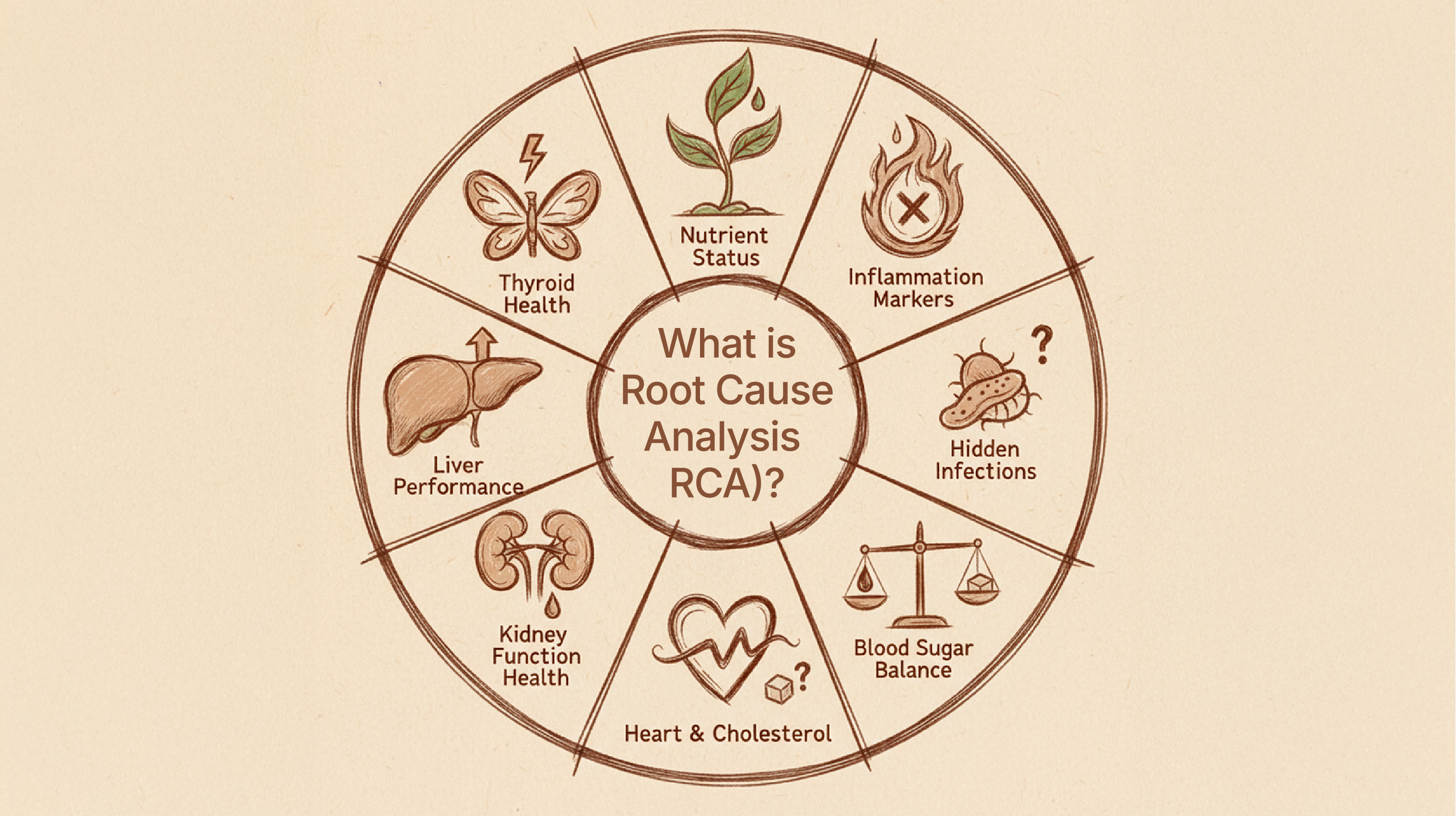BMI, or Body Mass Index, is a basic calculation that compares your weight to your height. It gives you an idea of whether your current weight is in a healthy range or not. Knowing your BMI is important because it helps you understand if you are underweight, overweight, or at a balanced weight. These numbers are not just about appearance. They are closely linked to your risk of lifestyle disorders, hormonal imbalances, fatigue, weak immunity, and metabolic issues.
A lot of people guess their ideal weight based on what looks good or what others say, but assumptions can be misleading. Your BMI (Body Mass Index) can tell you whether your weight is in a healthy range for your height, but it doesn’t show the full picture of your health. You might have a normal BMI and still struggle with fatigue, bloating, or hormonal issues. That’s because BMI only measures weight, not what’s actually happening inside your body. At iThrive, we look beyond numbers through our Root Cause Analysis (RCA), which studies your blood markers, nutrition, and lifestyle to find what your body truly needs. So, while BMI is a good starting point, real health comes from understanding your root causes. Check your weight status with iThrive’s free BMI calculator.
About iThrive’s BMI Calculator and How to Use It
iThrive’s BMI calculator online is designed to help you understand your current weight status in a quick and accurate way. Unlike random online tools, this BMI calculator India is part of a functional health approach. It gives you a clear idea of where you stand so you can take the next right steps.
You do not need any medical knowledge to use it. The process is simple and takes less than a minute.
How to use iThrive’s BMI calculator:
- Enter your height in centimeters or feet and inches
- Enter your current weight in kilograms
- Click on the calculate button
You will instantly see your BMI number along with the category it falls under. This quick calculation gives you a snapshot of your health status. Once you know your result, it becomes easier to understand what your body needs next. Interpret your BMI results.
BMI Categories and Ranges
Once you calculate your BMI using our Body Mass Index calculator, the next step is understanding what your number actually means. Here is a clear breakdown of the BMI categories along with what each range may indicate:
Underweight: < 18.5
If your BMI is below 18.5, it means your body weight may be lower than what is considered healthy for your height. This can be a sign of low muscle mass, nutritional deficiencies, poor absorption, weak immunity, or an underlying health condition. Book your RCA to find out why your BMI is low.
Normal: 18.5 - 24.9
This range is considered a healthy and balanced zone for most adults. It usually indicates that your weight is proportionate to your height and that your body is not under stress because of being too light or too heavy. However, even within this range, lifestyle and internal health still play a major role in how you feel. Even if your BMI falls within the normal range, it doesn’t always mean you’re completely healthy. Many people with a normal BMI still struggle with issues like fatigue, poor gut health, hormonal imbalances, or nutrient deficiencies. So while it’s a good sign that your weight is balanced, true health goes beyond numbers. Book your RCA (Root Cause Analysis) to know the full picture of your health.
Overweight: 25 - 29.9
A BMI in this range shows that your weight is higher than what is ideal for your height. Many people in this category do not notice changes immediately, but this stage often acts as a warning sign. It increases the risk of inflammation, insulin resistance, joint issues, energy fluctuations, and metabolic stress if not addressed on time. Book your RCA to understand the causes behind weight gain.
Obese: ≥ 30
A BMI of 30 or above means your body is carrying excess weight that can start affecting multiple functions. This range is linked to a higher risk of chronic conditions like diabetes, PCOS, hypertension, heart disease, fatty liver, hormonal imbalances and reduced mobility. Obesity is not just about eating more. It can also be driven by deeper issues in the body. Check your weight status with our BMI calculator for men, women, or kids and teens.

These categories help you understand where you currently stand, but BMI alone cannot explain why your number is higher, lower, or normal. The real insights come when you look deeper into the causes behind your weight.
If Your BMI Isn’t Ideal - Time for Root Cause Analysis
Your BMI is more than a number. It is a signal from your body telling you that something may need attention. Whether it is higher or lower than the healthy range, it is important not to just follow random diets or workout fads. Instead, understanding the root causes behind your BMI can guide you to long-term health and sustainable results.
Reasons You May Be Overweight
Many people think weight gain is always caused by eating too much, but it is rarely that simple. Several internal and external factors can contribute:
- Hormonal Imbalances: Hormones act like your body’s control system for weight. Thyroid issues, insulin resistance, PCOS, or high cortisol from stress can cause your body to store fat instead of burning it efficiently. For example, someone may follow a strict diet but still gain weight because their hormones are not balanced.
- Chronic Inflammation: Inflammation may sound like something you feel physically, like pain or swelling, but hidden inflammation in the body can slow down metabolism, make fat harder to burn, and cause fluid retention. Chronic inflammation often results from processed foods, stress, infections, or environmental toxins.
- Gut Health Issues: A healthy gut is crucial for proper digestion and nutrient absorption. Problems such as gut dysbiosis, slow digestion, or infections like H. pylori can disrupt metabolism and even cause your body to store extra fat.
- Nutrient Deficiencies: Deficiencies in vitamins and minerals like vitamin D, vitamin B12, magnesium, or zinc can interfere with energy production, fat metabolism, and appetite regulation. This can make it harder to lose weight even with exercise.
- Lifestyle Factors: Sedentary habits, irregular sleep, high stress, and emotional eating can all contribute to weight gain. Even if your diet looks healthy, these factors may keep your weight higher than desired.
- Toxin Accumulation: Your liver and other organs help process toxins, but exposure to pollutants, chemicals, or a diet high in processed foods can interfere with fat metabolism and hormone balance.
Understanding these causes allows you to approach weight management effectively. It shifts the focus from just losing weight to improving your overall health.
Book your RCA to identify why your BMI is low and improve your health.
Reasons You May Be Underweight
Being underweight is also more complex than it seems. Simply eating more may not solve the problem because underlying issues could be preventing your body from gaining healthy weight:
- Malabsorption and Gut Issues: Even if you eat enough food, your body may not absorb nutrients properly due to digestive disorders, gut inflammation or infections. This can lead to low energy, weakness and difficulty gaining weight.
- Hormonal Problems: Conditions like hyperthyroidism or adrenal imbalances can increase metabolism too much, causing your body to burn calories faster than it can replace them.
- Chronic Inflammation or Stress: High stress and inflammation can suppress appetite and prevent your body from gaining muscle or fat in a healthy way.
- Nutrient Deficiencies: Low intake or poor absorption of protein, essential fats, vitamins, and minerals can prevent muscle building and healthy weight gain.
- Underlying Medical Conditions: Chronic illnesses or metabolic disorders may contribute to being underweight despite following a healthy lifestyle.
Finding the real reasons for being underweight helps you improve energy levels, immunity, mental clarity and overall vitality, instead of just focusing on eating more calories.
Book your RCA to identify why your BMI is low and improve your health.
How RCA Gives Deeper Insights Beyond BMI
At iThrive, we believe your BMI calculator result is just the first step. Whether your BMI is low, high, or even within the normal range, it doesn’t show what’s happening inside your body. If you want to check your health status in detail, iThrive’s Root Cause Analysis (RCA) is the next step. Our approach is based on functional nutrition, meaning we don’t just focus on symptoms, we look at how your body functions as a whole.
What is Root Cause Analysis (RCA)?

RCA is a comprehensive health assessment where more than 55+ blood parameters are analysed. Based on these, your full health status is evaluated, helping you understand why your body behaves the way it does, including weight management, energy levels, immunity, digestion, and hormone balance.
Here’s what RCA at iThrive analyses and why it matters:
1. Nutrient Status
Checks vitamins and minerals like B12, Vitamin D, iron, magnesium, folate, and zinc.
Even mild deficiencies can affect metabolism, energy, muscle building, appetite, immunity, and fat storage. Identifying them early helps you take corrective action before health issues develop.
2. Inflammation Markers
Assesses CRP, ESR, and uric acid to detect hidden chronic inflammation.
Chronic inflammation can silently affect weight, cause insulin resistance, fatigue, joint pain, or increase the risk of long-term conditions. Early detection allows preventive measures.
3. Hidden Infections
Undiagnosed infections can impact digestion, immunity, energy, skin health, and even weight. RCA uncovers these hidden causes.
4. Blood Sugar Balance
Analyses insulin, HbA1c, and early signs of insulin resistance. Even with normal fasting glucose, your body may struggle with sugar balance. Detecting imbalances early can prevent weight fluctuations, cravings, energy crashes, or future diabetes.
5. Heart & Cholesterol Health
Goes beyond HDL and LDL to check triglycerides, ApoB, oxidized cholesterol, and inflammation markers. Provides a real picture of cardiovascular risk, especially for people with high BMI, overweight tendencies, or metabolic concerns.
6. Kidney Function
Examines BUN, creatinine, eGFR, uric acid, and electrolytes. Detects early kidney stress, toxin buildup, and mineral imbalances that may not appear in basic tests.
7. Liver Performance
Tests SGOT, SGPT, GGT, and bilirubin. The liver regulates fat metabolism, hormone balance, and detox. Early detection of fatty liver or sluggish detox helps optimize metabolism and weight management.
8. Thyroid Health
Analyses TSH, Free T3, Free T4, reverse T3, and antibodies. Detects early thyroid issues or autoimmunity that can impact weight, energy, mood, and metabolism which is often missed in routine tests.

Conclusion
A BMI calculator is a powerful starting point. It helps you understand where you stand — whether you're underweight, in the healthy range, overweight, or obese. But BMI alone does not explain why your body is in that range.
If your result isn’t ideal, do not panic or jump into random diets. Focus on understanding what’s really happening inside your body. Root Cause Analysis helps you go beyond the number on the screen to uncover real reasons behind weight changes.
Start by checking your BMI with iThrive’s free BMI calculator.
If your BMI is too high or too low, take the smarter route. book your RCA, check your weight status, and book a free consultation.
iThrive’s BMI calculator India is suitable for men, women, kids, and teens. Find out what is my BMI in under a minute and start your journey to better health today.
Subscribe to our newsletter and receive a selection of cool articles every week





.png)


.webp)

.jpg)
.jpg)










